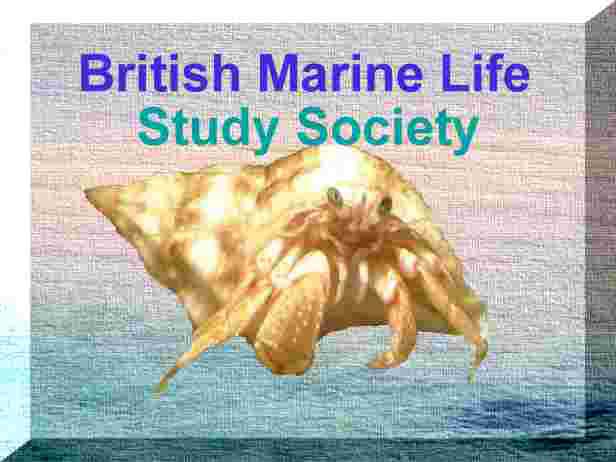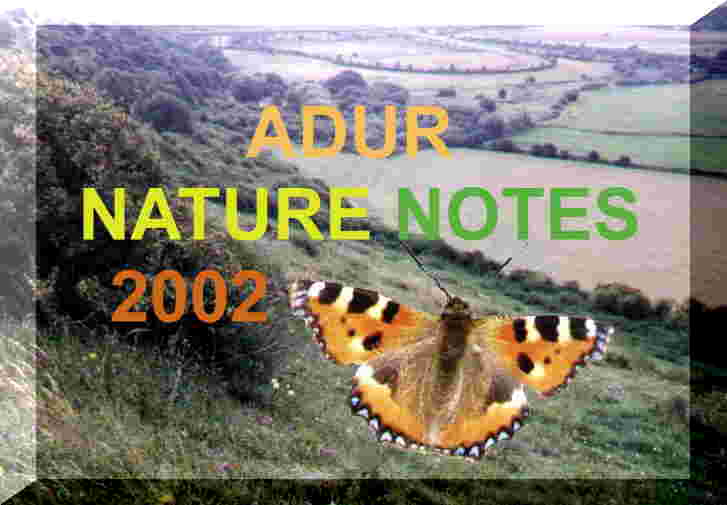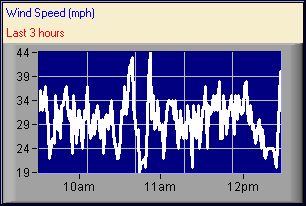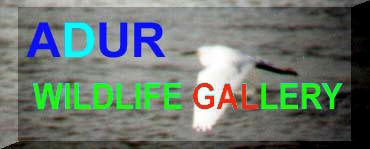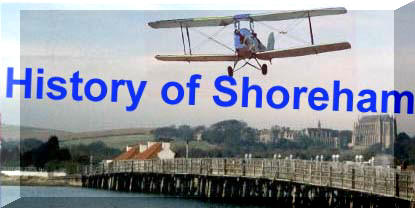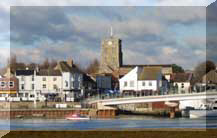
|
NEWS BULLETIN FOR THE ADUR VALLEY |
 |
| LOCAL
ORGANISATIONS |
| LOCAL RESIDENTS PAGE |
| Adur Flood Plain |
| Chalk Downs |
| Coastal Fringe |
| Intertidal (Seashore) |
| Nature
Notes for
Lancing Ring |
| River Adur Estuary |
| River Adur |
| Sea (off Sussex) |
| Town & Gardens |
| Widewater Lagoon |
| AREA MAP |
| Shermanbury (Adur Valley) |
| WSCC LIBRARY |
|
|

This is the first published
Electronic Newspaper for
Shoreham-by-Sea and the
Adur Valley & District, West Sussex, England
Local News
ROPETACKLE DETAILED PLANNING APPLICATION
SU/216/02/TPThe Editor
Shoreham HeraldDear Editor,
Ropetackle Plan
I find myself agreeing with John Curtis's letter of 7 November 2002. I concur that the plan for Ropetackle lacks creative vision and that the riverside position is completely wasted. For such an important site at the focal point of the High Street, next to the Conservation area deserves a design that will enhance the appearance, not a dreary apartment block with a small community facility and a few offices included to comply with the Ropetackle Development Brief.
I would also like to remind SEEDA that Shoreham already has a chronic lack of employment opportunites and by buidling flats on the only remaining space in the town centre for offices and businesses is just bad planning. Where are the people going to work? Not in Adur, they are not. Currently eight of ten people work outside the district. There is no place for more homes without equivalent jobs.
I do not want to appear entirely negative, I am prepared to draw up a plan that hopefully would have the merits of both good taste, be advantageous to everybody and be an economically viable proposition as well.
Yours faithfully,
Andy Horton
Corbyn Crescent, Shoreham-by-Sea.Representations (Link to Word Document)
8 October 2002
Adur World Oceans Day meetingClubs and societies are invited to hold an evening Adur World Oceans Day event.
See below for the AWOD events pencilled in for the Adur Festival 2003.
Please send any comments to: Andy Horton
Glaucus@hotmail.com
Wildlife Notes
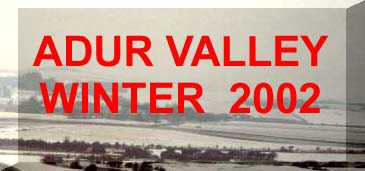 |
 |
 |
 |
24 November 2002
The usual Coot (44) and Moorhen (6) on Brooklands Boating Lake, east Worthing, were joined by 16 Pochard and 1 Shelduck. On the adjacent pitch & putt course, a dozen Brent Geese were chased off by dogs, the geese flying east.Up the Coombes Road from Lancing College to Steyning this morning, I was shocked to see masses of thick hedgerows and trees being ripped out both along the roadside and around the adjacent fields. A stretch of at least 300 metres from Passies Pond to Botolphs Church are in the process of being bulldozed along with most of the willows around Passies Pond, what a sad sight..... and a right mess!
Both Reports by Bob Kent (Lancing)
23 November 2002
A quick view of a Willow Tit, Parus montanus, fluttering above the bushes on the northern margins of New Monks Farm, east Lancing, near the weighbridge, (TQ 192 057), to the west of Withy Patch, was my first recorded sighting of this bird that I am unfamiliar with. The call described as "air, air, air" (I am not sure how I would describe the triple call) was clear and this may distinguish it from the similar Marsh Tit (not definitely). However, the Shoreham & District Ornithologal Society booklet describes this bird as the rearest of the titmice in the local area, so there must be a doubt at my fleeting observation as I cycled past.
UK Wildlife Discussion
Sussex Ornithological Society Titmice17 November 2002
Pochards were seen on Brooklands Boating Lake, east Worthing.Report by Jan HamblettAn adult winter Great Northern Diver was seen at the eastern end of Shoreham Harbour at 3:00 pm.Report by Michael Rossor via Sussex Ornithological Society News
16 November 2002
Near the Information Kiosk by Widewater Lagoon, two uncommon Sussex birds made a brief visit: a single Black Redstart and a couple of Stonechats. It is interesting how the Widewater provides a temporary haven for a large variety of the less familiar birds. The identity of these birds were confirmed by Sussex Ornithological Society observers.Report by Jan HamblettLancing Nature Newsletter (November 2002)14 November 2002
An extra Little Egret was seen on the margins of Widewater Lagoon. Not so little either, these two birds appeared as white herons at first and the appearance of their size is dependent on their behaviour, skulking around the margins makes them appear smaller. One bird seemed to have such pronounced rings on its legs it appeared like it was in plaster.
Then a hailstone broke out on this squally day where a brief gale blew up and in minutes the wInd had reduced to a breeze. An example of the variation is shown on the graph.
Shoreham Beach Weather
Beaufort Scale11 November 2002
The Little Egret is back feeding on in and around Widewater Lagoon after a break for the summer months.
Egret Information Update10 November 2002
In the garden of 40 The Drive (near Buckingham Park), Shoreham-by-Sea, (TQ 219 063) at least eight Blackbirds (seven male) were in the garden at one time as the rain fell steadily down. The attraction was the bright red berries of the small Holly Tree, on which the Blackbirds were obviously feeding, the bright red berries distinctive in their yellow bills. the Blackbirds were coming and going and there were nore than eight birds in total taking advantage of this food resource and having a look at the small garden pond and bird bath. A Wren flew out of the Holly Tree as well.
Shoreham Town & Gardens Wildlife pageLancing Clump was shrouded in a light mist, rain fell in intermittent bursts; the woodland floor covered with fallen leaves, the trees almost bare after the battering of recent gales. The atmosphere was heavy and sombre, the weight of the woodland canopy all around the feet, ready to begin the process of replenishing the soil. The recycling of dead timber was in evidence with the fruiting of several clumps of fungi, including the Jews Ear and the Shaggy and Golden Pholiotas.
Full Report and Photographs9 November 2002
A Grey Heron was perched on the second groyne on Kingston Beach as the tide came in this morning. A Kestrel hovered over Middle Road Playing Fields, Shoreham.7 November 2002
A Red-breasted Merganser dived under the water for its diet of small fish between the Toll Bridge and Railway Viaduct on the Adur estuary.Report by Jan Hamblett
Near the Old Fort, Shoreham beach, on the strandline to the west of the harbour pier, five Turnstones in black (actually dark brown) with grey-white breasts and distinctive red legs and large feet, were foraging amongst the accumulated seaweed and occasional dead Dogfish, seashells, broken fishing pots and single dried out Mermaid's Purse (Thornback Ray). The Turnstones could be seen very clearly and closer than other waders, confident of their own camouflage which was not nearly as efficient as that of the Ringed Plover or Pied Wagtail, the commoner birds of the shingle beach and strandline in the colder months. Then to my surprise I disturbed a Red Admiral Butterfly amongst the seaweed. The anglers were catching Whiting, Flounders and small Bass from the harbour arm.5 November 2002
Lancing Beach
Late Butterfly
A fresh looking Small Tortoiseshell Butterfly was disturbed from under a clump of Honeysuckle as I mowed the lawn of a garden close to the Saltings roundabout on the A259, south Lancing on the border with Shoreham-by-Sea.Collecting a few rocks for aquarium props in fading light, a moonless evening under torchlight, there were dozens of Squat Lobsters, Galathea squamifera, and at least one red-eyed Velvet Swimming Crab, Necora puber. I thought that I picked up two, but the following day, I noticed that the crab had pale blue eyes and this I now think may be a different crab altogether, Liocarcinus arcuatus, the Arch-fronted Swimming Crab which I have never discovered before, nor have I heard reported before from the shore. The identity of this crab has been confirmed by Dr. Reindert Nijland.
This small crab (carapace width 25 mm) had a heavy carpus on both chelae, a rough carapace in chocolate brown, swimming legs that were pointed, slower moving than Necora, with also are pronounced creamy white underside, and at dusk that was only its fractionally different movement that made it stand out from the Shore Crab. There were no "teeth" between the eyes, and the carapace was in a straight line between the eyes, with red antennae and antennules.
BMLSS Intertidal Crabs
Marine Life News4 November 2002
A late Red Admiral Butterfly flutters by Eastern Avenue railway crossing gates in Shoreham town. Mallards are notable in their scores on the River Adur estuary and Widewater Lagoon. There was also a report of Mallards on a stubble field near Mill Hill. A Grey Heron was probing for small fish in the pools at low tide to the west of the Footbridge.
Rockpooling under Worthing Pier
It is getting dark as the tide reached its lowest point. Amongst the Squat Lobsters, Galathea squamifera, and the usual fauna, of special note was a couple of first year red-brown Ballan Wrasse, Labrus bergylta, the first from this beach and only one was captured (the other one got away in the murk) and when I delved around in the bucket at home a Small-headed Clingfish, Apletodon dentatus, stuck to my hand. Red Ballan Wrasse are not common on Sussex shores: I have only caught one before. Young 5-Bearded Rockling were present, at least a dozen, plus an adult Blenny that was left in-situ.
British Marine Life Study Society3 November 2002
Below Henfield on the same Downs Link track and a troup of Long-tailed Titsagain only 2 metres away. I walked to Chanctonbury Ring then south nearly to Cissbury ring then back along Monarch's way. Between Cissbury and joining the South Downs Way above Steyning and about 16 metres away there were another couple of Roe Deer. This time they did not run away but watched me walk by. On the way down and just north of Steyning I spotted a late dragonfly. It flew away too fast but Im guessing it was a darter of some description.Report by Allen Pollard via the the Adur Valley EForum
The mudflats north of the Toll Bridge are dotted with Lapwings, poised with
heads into the breeze (hundreds at this time of the year and throughout winter at low tide). Katherine Hamblett (8) wondered what might be under the rocks in the soft wet silt, it soon became clear that almost every rock has at least one small Shore Crab hiding beneath it. Lifting items of driftwood and other flotsam above the tideline in the hope of discovering Slow Worms, yielded nothing more than hundreds of spring-loaded Sandhoppers which scatter and vanish as the security of their hideout is breached.
2 November 2002
The capture on rod and line by Peter Weight (Lancing) of a Boar Fish, Capros aper, from Hove beach is the very first record of this fish caught from the shore off Sussex. The books say that this fish lives in depths of over 100 metres and there are no seas of this depth on the English side of the English Channel.This pretty little red and silver rhomboidal fish about 55 mm long, excluding its caudal fin, large eye and large protractile mouth, with a spiky first dorsal and vibrating second dorsal and second anal fins (vibrating like the dorsal fin of a pipefish). Although this fish is rarely caught, it is abundant in deepish water (on the edge of the continental shelf in the western approaches of the English Channel) and it is just that normal fishing methods do not capture this small fish. All records and especially all live records from the shore or on dives, and all Sussex records are newsworthy.
This fish is thriving in the BMLSS private aquarium (Shoreham-by-Sea). This fish is rarely on display in British Public Aquaria and the only known display of this fish was for several years at Mevagissey Harbour Aquarium.
Previous Sussex Record of a Boar Fish
Previous Report from the Channel Islands
BMLSS Boar Fish2 November 2002
As I walked down the old railway track below Partridge Green a couple of small Roe Deer were feeding. This was the first time I have seen deer on the track. (This is the Downs Link). Below Henfield on the same track a Goldcrest about eye height sat in a branch about 2 metres away. I stopped and watched and the smallest British bird just hopped from branch to branch.Report by Allen Pollard via the the Adur Valley EForum
31 October 2002
The sudden flight of a "little brown bird" with a glimpse of the white outer tail feathers but in an unusual place on Lancing beach (flying from Beach Green to the shingle banks) (TQ 185 037) where the bird perched on a wooden sea defence structure above high tide level and I could see the full brown speckled colour of this bird, which is rarely possibly in the meadows. It looked larger than a sparrow. My favourite identification is a Water Pipit, although it was probably a Meadow Pipit. (The other uncommon winter visitor pipit on this coast is the Scandanavian Rock Pipit, but this is a lighter coloured bird, noticeable as a Rock Pipit because of its grey outer tail feathers.)
Chirms of 20+ Goldfinches flew around their usual bushes between Widewater Lagoon and the sea, and in adjoining bushes, the House Sparrows made a cacophonic racket as a Kestrel flew overhead.27 October 2002
Moderate Gale Force 7 winds (36 mph at 10:26 am) gusting to Storm Force 10 (64 mph at 6:36 am), but not accompanied by heavy rain, blow the trees about. By midday the wind had reduced to a Fresh Breeze Force 5 (24 mph). Even so, in the early afternoon, the branches of the large trees in Buckingham Park were waving about, indicative of Force 6.

Shoreham Beach Weather
Beaufort Scale
Weather Links24 October 2002
UK Wildlife Gardening Yahoo Group
In recent days I have seen a party of about six Long tailed Tits, Aegithalos caudatus, a pair of Blue Tits, a Great Tit in my south Lancing garden. Today a Blackcap, Sylvia atricapilla, was seen and probably confirms identity of a sound heard about a week ago, which when described to an expert, it was suggested as being from a distressed Blackcap.
The ripe fruit on the 10 metres high Hawthorn Tree is one of the attractions for some of the birds, others like the peanuts hanging from a garden Crab Apple Tree. An occasional butterfly passes without pause, today a Red Admiral went by heading east. (TQ 186 044)
Lancing Nature Nature News (October 2002)22 October 2002
A Speckled Wood Butterfly in good condition was in my Shermanbury garden. Also the Greater Spotted Woodpecker is still making visits to the bird feeder although the red head has turned to black and his frontage looks a little dirty.Report by Allen Pollard2001 Woodpecker Report with photograph20 October 2002
A Kestrelwas seen flying over the gardens at the rear of my house in south Lancing about first floor height. It was lazily pursuing birds which were mostly Starlings, all of which became very agitated and flew in the opposite direction. (TQ 186 044)
19 October 2002
Six Small Tortoiseshell Butterflies were seen between Beeding Hill and Truleigh Hill.Report by Allen Pollard via the UK-Leps EForum
A chirm of over 30 Goldfinches flocked near the Church of Good Shepherd on Shoreham beach. A Speckled Wood Butterfly, faded but mostly intact, fluttered around in Lancing town centre by the pet shop. On the airport side of the A27 opposite the Sussex Pad, a distinctive black-blue banded dragonfly hawked about five metres over the roadside bushes. This was a Migrant Hawker, Aeshna mixta.
Adur Dragonflies
2001 Report
ADUR VALLEY NATURE NOTES 2001 WINTER Nature Notes 2001 JANUARY - MARCH SPRING Nature Notes 2001 APRIL - JUNE SUMMER Nature Notes 2001 JULY - SEPTEMBER AUTUMN Nature Notes 2001 OCTOBER - DECEMBER
- British
Web Sites
Dragonflies
of the Hampshire & Surrey Borders
Flight
Times (First Seen)
- Historical
Snippets
- By AD 43, this part of Sussex (before it was called Sussex) was ruled by Cogidumnus (probably a Roman) at the time of the second Roman invasion (or he was installed as King by the invading Romans).
- (Both Tincommius & Cogidumnus were important rulers of the Atrebates tribe with a power base centred in the south-east. It appears that it was not until the Romans arrived that Cogidumnus became King [Rex] and they were then known as the Regni or the Regnenses? )
- Sussex Case for the Roman Invasion (Link)
After the Romans invaded in AD 43 we hear of a ruler called Togidumnus, this name beginning with a T now favoured over the name Cogidumnus.
A reference to assist is Barry Cunliffe's book on Fishbourne Roman Palace, (Tempus 1998) in which on p 108 he discusses the two firm pieces of evidence about this ruler.
1. the inscription found in Chichester mentioning Tiberius Claudius [ ]ogidubnus as "rex magnus Brit." the great king of the Britains" permitting the building of a temple.
2. a passage in Tacitus (Agricola XIV which reads .."certain states were given to Cogidubnus (he remained faithful down to our own times) according to an old and long accepted Roman tradition of using kings also as instruments for slavery" (i.e. subjugation of native peoples). (Tacitus:born AD 56 or 7; died after 117 apparently)
I do not have the reference for the recent argument to spell his name with a T rather than a C, but it seems to have become the accepted spelling.
No one can answer the details of whether Togidubnus was already the local ruler, or whether he was inserted as a puppet ruler. On Saturday night's TV programme which included Fishbourne RP, Barry Cunliffe was suggesting that Togi was likely to have been brought up in Rome, and come back to Britain.
It has long been argued that Togi was quite young at the time of the invasion, because he must have lived & ruled for quite long time subsequently, as inferred by the Tacitus passage, and if indeed it was he who built FRP in its grand style in cAD 75-80, removing earlier buildings in the area.
As to the name of the local political unit - I recall Mark Hassall stating rather firmly the case for one name as opposed to the other at the Roman Invasion conference in Chichester a few years back, but I have forgotten what his argument hinged upon.
From: "Caroline Wells" <CarolineWells@talgarth.demon.co.uk>
Sussex
Past Discussion group on Yahoo
SUSSEXPAST
Sussex Archaeological Society EGroup
http://groups.yahoo.com/group/sussexpast
Notes:
Kent Case for the Roman Invasion (Link)
Adur Valley Book List
- Words
of the Week
bruxism | brLksz()m | n. M20. [f. Gk brukhein gnash the teeth + -ISM.] Med. Involuntary or habitual grinding or clenching of the teeth.
---------------------------------------------------------
Excerpted
from The Oxford Interactive Encyclopedia
Developed
by The Learning Company, Inc. Copyright (c) 1997 TLC Properties Inc.
- Tucows
Software Reviews

|
Web
Monkey :
The Web Developer's Resource
Location:
http://hotwired.lycos.com/webmonkey/
Digital
Photography Review
http://www.dpreview.com/
The default files created
have the suffix *.html so anybody using the program has to be a little
bit cautious about overwriting existing files.
Computing
Net Support Site
(for computing problems) ****
http://computing.net/windows95/wwwboard/wwwboard.html
The upsurge of EFora on
all subjects (a
few have been recommended before in these bulletins) are an important way
in which the Internet
will change the world.
A list of recommended eFora
are shown in the left hand column. Please make any suggestions.
Smart
Groups
At
present almost all groups are receiving sustained attacks by spam mail
(junk mail) which is a serious nuisance.
Fight
Spam on the Internet
http://spam.abuse.net/
LiteratureThey hang the man and flog the woman
That steal the goose from off the common,
But let the greater villain loose
That steals the common from the goose.The law demands that we atone
When we take things we do not own
But leaves the lords and ladies fine
Who take things that are yours and mine.The poor and wretched don't escape
If they conspire the law to break;
This must be so but they endure
Those who conspire to make the law.The law locks up the man or woman
Who steals the goose from off the common'
And geese will still a common lack
Till they go and steal it back.- English folk poem circa 1764
Image Gallery

Boar Fish
Photograph by Steve Cropp

Religion in the Adur District (Churches)
Archaeology in Sussex to AD 1500 ****
WSCC
LIBRARY *****
Excellent
and essential service with a full catalogue of books, CDs, videos, on-line
renewals, book ordering.
- The
Glaucus 2000 CD-ROM includes the complete Shoreham-by-Sea
and Adur Valley web sites, as well as shareware
and free programs

ADUR VALLEY EFORUM PAGE |
Events30 November 2002
Shoreham Society Christmas Fayre
Shoreham Community Centre
Pond Road
10:30 AM - 4:30 PM.
6-7-8 December 2002
Shoreham Christmas Shopping Festival
Second Saturday every month.
** December 2002: (date to be confirmed)
Farmer's Market
Fresh
produce
East
Street, Shoreham-by-Sea
ADVANCE
NOTICE
Adur
World Oceans Day 2003
ADUR FESTIVAL ENTRIES
Shoreham and the River Adur's seafaring traditions stretch back for over a millenium. In the days of sailing ships the public hards each side of the Coronation Green were important for loading and unloading cargo and Shoreham has a history of seafaring and fishing that stretches back centuries to the beginning of written records and before.
The
Adur Festival celebrates this tradition and the local connection with the
sea with the opening procession from St. Mary de Haura church down East
Street (known as Oriental Street in the 18th century) down to River Adur
to Coronation Green (Legal Quay in medieval times) in the centre of Shoreham-by-Sea.
31
May 2003
ADUR
WORLD OCEANS DAY
Coronation
Green, Shoreham-by-Sea
10:00
am - 4:00 pm
Admission:
Free
Open
air celebration of the wildlife of the oceans with exhibitions of live
marine creatures, marine aquaria, nets and fishing gear, colouring competitions
and other interactive activities for children, whales and dolphins exhibits,
films and video shows, sea food tasting, all designed for a family day
out. Allow at least one hour, preferably more, to wander around the marquees,
with experts on hand to answer questions about life in the sea and on the
seashore.
Organised
by the Adur World Oceans Day group
3
June 2003 - 7 June 2003
10
June 1993 - 14 June 2003
ADUR
VALLEY BIODIVERSITY EXHIBITION
Adur
Civic Centre Foyer
9:00
am - 4:00 pm
Admission:
Free
In June 1992, over 150 Heads of States signed the Convention on Biological Diversity at Rio de Janeiro. They did so to express a shared belief that action must be taken to halt the worldwide loss of animal and plant species and genetic resources.
The
Adur Exhibition will celebrate the varied wildlife of the lower Adur valley
including the whole of the Adur District. It will contain photographs and
information from local wildlife groups.
Organised
by Adur Valley Biodiversity
Network
NEW EVENT
Date
to be decided
ADUR
WORLD OCEANS DAY
Indoor
venue to be decided
Evening
session
Admission:
Free
A
series of short illustrated talks and documentary video films about the
undersea world around the British Isles: a unique opportunity to see the
fascinating marine wildlife both above and below the waves with original
presentations. This educational series is designed for the older age group,
over 11 years old, and should appeal to both the novice and the experienced
naturalist and marine biologist.
Organised
by the Adur World Oceans Day group
- Adur
On-line Events page
- http://appspace.nexus-solutions.net/arc/asp/diary/diaryoutput.asp
- Please send in any details of local events.
- Web
Sites
American
Heritage Dictionary of the English Language:
Fourth
Edition *****
- SPONSORSHIP OPPORTUNITY
For any company or organisation wanting nationwide green publicity, there is an opportunity to sponsor the journal "Glaucus" of the British Marine Life Study Society.
There remains sponsorship opportunities on the BMLSS (England) web site and other publications, including Torpedo.
Sponsorship is also available for the Adur Torpedo Electronic News Bulletin and the Shoreham-by-Sea web pages (which preceded the Adur Resource Centre web site), which would be more suitable for a local firm(s).
Web Site Design Services are available from Hulkesmouth Publishing
Normal
advertisement rules apply.
Submissions
accepted by EMail only.
Adur Torpedo was written, designed and distributed by Andy Horton.

